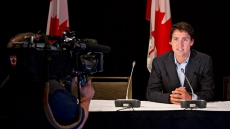LAC-MEGANTIC, Que. - The combination of a lack of government oversight and a penny-pinching railway contributed to the deadly oil-train disaster that devastated Lac-Megantic, says a report tabled Tuesday by Canada's Transportation Safety Board.
The federal agency's report, the first comprehensive account of last summer's crash to be released to the public, identified 18 key factors it says led to the Quebec catastrophe.
Among them, the TSB pointed to roles it says were played by the Montreal, Maine and Atlantic Railway and Transport Canada in the tanker crash, an incident that came amid a growing pan-continental, oil-by-rail industry.
"Who was the guardian of public safety?" TSB chair Wendy Tadros said in Lac-Megantic, where the report was unveiled.
"That is the role of government. To provide checks and balances — oversight. And yet this booming industry, where unit trains were shipping more and more oil across Canada and across the border, ran largely unchecked."
The agency launched its year-long investigation after the MMA train broke loose from its parking spot uphill of Lac-Megantic in July 2013 and crashed into the community, killing 47 people. Almost all of the 63 derailed tank cars, which were filled with volatile crude, ruptured in the derailment and set off huge explosions that were even spotted by satellites in space.
The report also produced two new recommendations that the TSB argues would help prevent future runaway trains and keep a closer eye on companies like the now-bankrupt MMA, which it criticized for having a "weak safety culture" and "poor training" efforts for its employees.
The TSB said one of the recommendations would seek to ensure that safety systems of railways are adequate.
Tadros said the role of the regulator has been to determine whether a company has a safety management system. She believes Transport Canada should now undertake audits to find out if the company is truly managing safety.
"We're saying it's not enough," said Tadros of the current arrangement, adding that MMA did not have a functioning safety system.
The other new recommendation calls for requirements that rail operators use additional physical methods, such as wheel chocks or modernized braking technology, to improve train securement.
"There has to be a change in the Canadian rail industry," Tadros said.
"We have to look beyond just strict adherence to rules, because while those rules have changed over the years, you cannot always rely on people to stick to those rules 100-per-cent of the time.
"So, you need a backup defence and you particularly need this in high-risk industries."
In Ottawa, Transport Minister Lisa Raitt said her department will review the report and develop "concrete actions" to address the TSB recommendations.
"Today's report indeed does talk about higher expectations for Transport Canada," said Raitt, who inherited the transport portfolio after the disaster.
"I share those expectations and I know the public shares those expectations, too."
In January, the TSB called on Ottawa to take urgent action to enhance tank car safety standards, to reassess all potential routes used to transport dangerous goods and to implement emergency response plans whenever large volumes of these materials are shipped.
Tadros said the first three recommendations prompted swift reaction from the industry and the federal government. For example, Ottawa pledged in April to remove all old, rupture-prone tank cars, known as DOT-111s, off Canada's rails in the next few years.
"But more still needs to be done," said Tadros.
The latest recommendations seek to address some of the 18 contributing factors the TSB outlined in its report.
Three people are already facing trial for their alleged roles in the crash.
The MMA and three of its employees, including engineer Tom Harding, have each been charged with 47 counts of criminal negligence.
The report said Harding applied an insufficient number of hand brakes on the train — seven — and conducted an inadequate test before he left the convoy unattended and retired to a local inn for the night.
Before he left, the TSB says Harding called MMA's rail-traffic controller to report mechanical problems on the locomotive and thick smoke belching from its exhaust. They agreed he could leave the engine for the night.
Later that night, a fire broke out on the locomotive. Firefighters called to the scene shut down the locomotive, which gradually disengaged the engine's air brakes.
An MMA track foreman with no background in locomotives met the firefighters at the scene and, after consulting the rail-traffic controller, they left without restarting the locomotive. Eventually, the train started rolling toward Lac-Megantic.
Tadros, however, said the underlying causes of the accident go well beyond the number of hand brakes applied and the engineer's actions that night.
The factors listed in the TSB report include:
— A poor repair — using an epoxy-like material — to fix an engine failure on the lead locomotive, which led to the fire.
— Failure by MMA to provide proper training or supervision to ensure its staff could secure a train adequately.
— The train was parked unattended on a main line, with a steep grade and was led by a locomotive that was not in proper operating condition.
— Transport Canada failed to ensure that recurring safety problems at MMA had been corrected.
Lac-Megantic Mayor Colette Roy Laroche said Tuesday that she hopes changes are on the way now that it appears the derailment could have been avoided.
"We demand ... that government authorities assume their responsibilities," Roy Laroche told a news conference Tuesday after the report's release.
"We also demand deep changes to the culture of safety at Transport Canada and that of the rail industry. We demand that the changes are immediate."
Asked about the report, Edward Burkhardt, who was chairman of the former MMA, said Tuesday that he was studying it. He added that he did not want to comment.
"My lawyers will be very unhappy with me if I do," Burkhardt told The Canadian Press from his office in suburban Chicago.
"I don't have anything to say at the moment anyway because I haven't got through most of the report."
Tom Walsh, the lawyer representing Harding, praised the report Tuesday.
"They made it very clear that this is not a hand-brake problem and it's not a problem with just one person," he said in a telephone interview.
"It's a systemic problem that's been going on for years and years and years."
Walsh also hopes prosecutors will consider the report.
"I'd like the Crown to take a look at that report and wonder if it did the right thing by accusing these three people," Walsh said.
"I think there should be a little bit of soul-searching at that end because we don't even know the names of the people at Transport Canada or the people behind the corporate veil of MMA who were responsible for creating the conditions which allowed this tragedy to occur."
He added that Harding suffered a heart attack at the beginning of July due to stress, but that he is recovering well.
Walsh plans to talk to his client and says the engineer knows much of what's in the report because he had seen the provisional copy.
"He's basically in agreement with what's in the report," Walsh said of Harding.
When asked about the accused, Tadros said the TSB's mandate is to improve transportation safety while criminal proceedings remain the responsibility of the justice system.
The Crown has said that more charges could still be laid in the Lac-Megantic case.
Tadros said she hopes the report will help make railways safer in an era of increased oil-by-rail shipments.
She believes the crude oil shipment boom on North American railroads took people by surprise, including regulators, who did not introduce plans to manage the potentially dangerous cargo.
"This accident really has brought about, and will bring about, a sea change, I believe, in terms of the thinking of the rail industry, the shippers and the regulators," she said.





